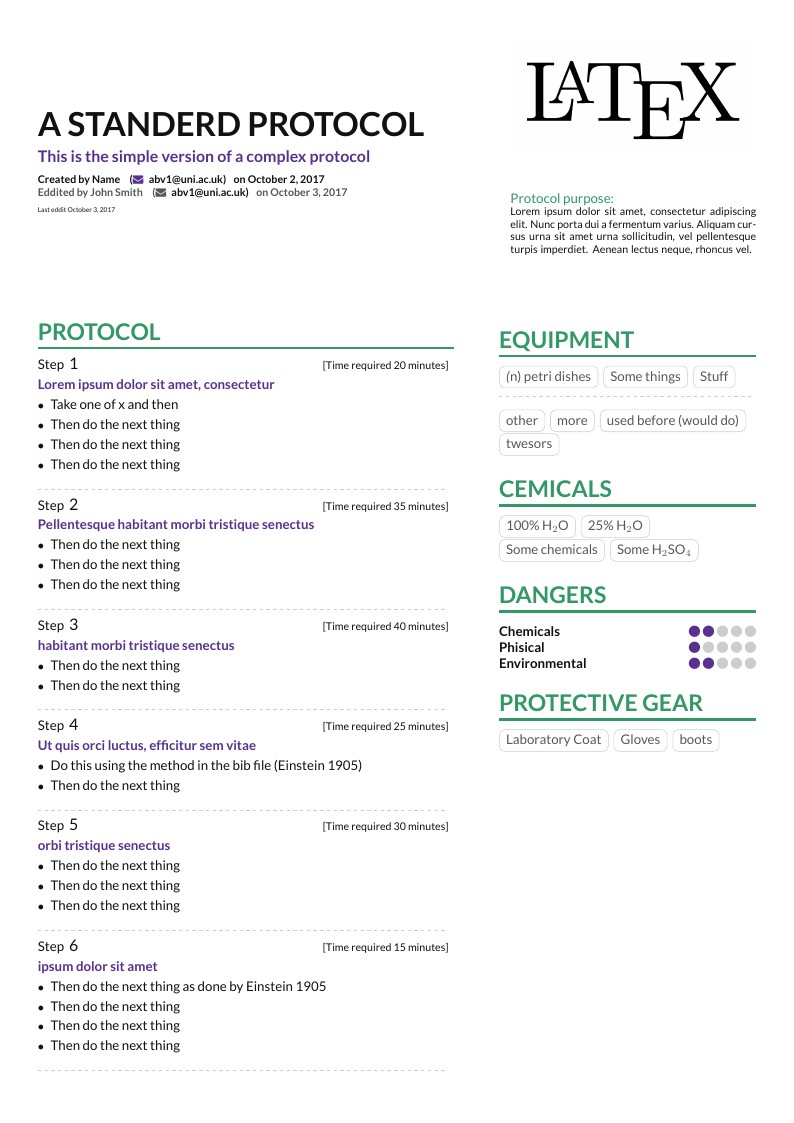
Standard Protocol
作者:
Danny Awty-Carroll
最近上传:
8 年前
许可:
LaTeX Project Public License 1.3c
摘要:
A standard laboratory protocol template using the Aberystwyth university colours.
Based on AltaCV by LianTze Lim (https://github.com/liantze/AltaCV)

A standard laboratory protocol template using the Aberystwyth university colours.
Based on AltaCV by LianTze Lim (https://github.com/liantze/AltaCV)

\documentclass[10pt,a4paper]{protocol}
% Change the page layout if you need to
\geometry{left=1cm,right=9cm,marginparwidth=6.8cm,marginparsep=1.2cm,top=1cm,bottom=1cm}
% Change the font if you want to.
% If using pdflatex:
\usepackage[utf8]{inputenc}
\usepackage[T1]{fontenc}
\usepackage[default]{lato}
% If using xelatex or lualatex:
% \setmainfont{Lato}
% Change the colours if you want to
\definecolor{Bright}{HTML}{58318f}
\definecolor{Green}{HTML}{319866}
\definecolor{Black}{HTML}{111111}
\definecolor{LightGrey}{HTML}{515c50}
\colorlet{heading}{Green}
\colorlet{accent}{Bright}
\colorlet{emphasis}{Black}
\colorlet{body}{LightGrey}
% Change the bullets for itemize and rating marker
% for \risk if you want to
\renewcommand{\itemmarker}{{\small\textbullet}}
\renewcommand{\ratingmarker}{\faSpinner}
%% sample.bib contains your publications
\addbibresource{sample.bib}
\begin{document}
\name{A Standerd Protocol}
\tagline{This is the simple version of a complex protocol}
\made{October 2 2017}
\logo{6.5cm}{"Logo"}
\docinfo{%
% can add more \addedtopeople
\madeby{Name}{abv1@uni.ac.uk}{October 2, 2017}
\addedto{John Smith}{abv1@uni.ac.uk}{October 3, 2017}
}
\purpose{
Lorem ipsum dolor sit amet, consectetur adipiscing elit. Nunc porta dui a fermentum varius. Aliquam cursus urna sit amet urna sollicitudin, vel pellentesque turpis imperdiet. Aenean lectus neque, rhoncus vel.
} % add a short discription of the purpose for this protocol
%% Make the header extend all the way to the right, if you want.
\begin{fullwidth}
\makeheader
\end{fullwidth}
%% Provide the file name containing the sidebar contents as an optional parameter to \need.
%% You can always just use \marginpar{...} if you do
%% not need to align the top of the contents to any
%% \need title in the "main" bar.
\need[materials]{Protocol}
\step{1}{Lorem ipsum dolor sit amet, consectetur}{20}
\begin{itemize}
\item Take one of x and then
\item Then do the next thing
\item Then do the next thing
\item Then do the next thing
\end{itemize}
\divider
\step{2}{Pellentesque habitant morbi tristique senectus}{35}
\begin{itemize}
\item Then do the next thing
\item Then do the next thing
\item Then do the next thing
\end{itemize}
\divider
\step{3}{habitant morbi tristique senectus}{40}
\begin{itemize}
\item Then do the next thing
\item Then do the next thing
\end{itemize}
\divider
\step{4}{Ut quis orci luctus, efficitur sem vitae}{25}
\begin{itemize}
\item Do this using the method in the bib file (\cite{einstein})
\item Then do the next thing
\end{itemize}
\divider
\step{5}{orbi tristique senectus}{30}
\begin{itemize}
\item Then do the next thing
\item Then do the next thing
\item Then do the next thing
\end{itemize}
\divider
\step{6}{ipsum dolor sit amet}{15}
\begin{itemize}
\item Then do the next thing as done by \cite{einstein}
\item Then do the next thing
\item Then do the next thing
\item Then do the next thing
\end{itemize}
\divider
\clearpage
\need[otherinfo]{Sources}
\nocite{*}
\printbibliography
\divider
%% If the NEXT page doesn't start with a \need but you'd
%% still like to add a sidebar, then use this command on THIS
%% page to add it. The optional argument lets you pull up the
%% sidebar a bit so that it looks aligned with the top of the
%% main column.
% \addnextpagesidebar[-1ex]{page3sidebar}
\end{document}